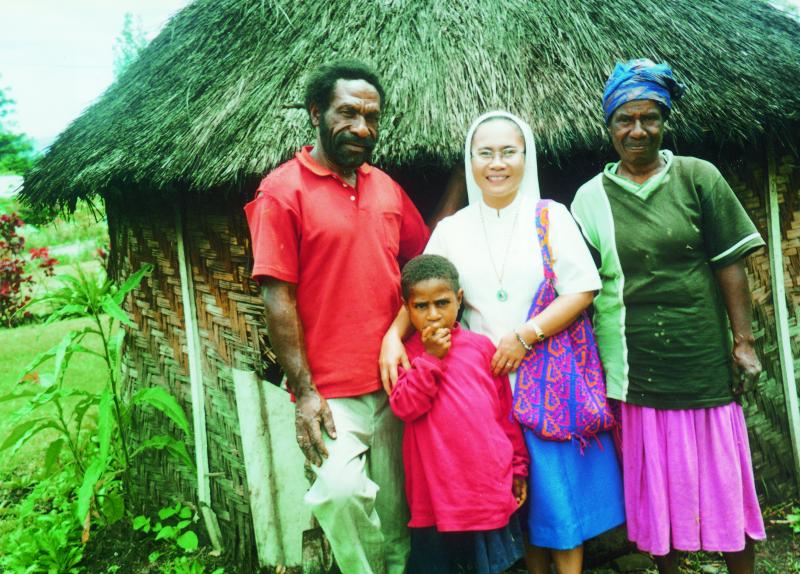Life On The Mountaintop
By Sister Maria Luisa Tomaro OND
Moving from a small island to a mountainous area is not without its difficulties, as Sister Maria Luisa knows only too well.

Reading Misyon regularly encouraged me to share my mountain experience here in the Diocese of Daru-Kiunga, Western Province, PNG. I was in Daru Island before but we closed our mission there so I was transferred to the mountain of Golgobip, a different experience with different people in a different place and situation. In Daru, I was surrounded by the ocean but now am surrounded by high mountains without roads and cars. The only means of transportation is the plane. If it doesn’t come because of bad weather or no passengers from the center we, my sister companion and our parish priest, are stranded and have no food to eat except kau-kau and taru (kamote and gabi), the people’s staple food. Anyway, by God’s grace we survive.
Their Ritual
We had the blessing of a church by Bishop Gilles Côté SMM and other visitors from Daru. The people planned to kill three pigs. A day before the blessing I wondered as I saw three posts in front of the new church. The following morning I saw a pig tied to each post. Suddenly three men wearing traditional dress with bows and arrows went outside the church. They sang and danced around the pigs. People came to witness the ritual and the three men slowly shooting the pigs with their bows and arrows so that the pigs’ blood spread out in front of the church.
I asked what it meant. I learned that the ritual killing of the pigs, used for blessings and big feasts, is an expression of thanksgiving to God by the people for all the graces they have received, offering the best that they have. For them, pigs are very precious animals. Piglets stay in the people’s houses until they grow up, sleeping under the same roof.

Enough for All
After Mass the people gathered together to cook a special dish of vegetables and pork. When the food was ready, they divided and shared it by clan, a ‘multiplication of food’ in which all had enough to eat.
Despite my injury
In the afternoon Bishop Côté and myself with some leaders left the place to go to another village for Confirmation. We walked on the rocky high mountain where there was no clear path. Unluckily, before we reached the village, I slid down and badly injured my left hand. Pain reliever helped me sleep that night. The following morning we walked again to another village, a journey of eight hours. I don’t know how I managed but I felt no pain in my swollen hand. The healing touch of God must have been working in me. I reached the place with joyful perseverance and a feeling of victory because I made it.
Mountains after mountains
After three months, I went again with our parish priest and his assistant to visit the villages and give seminars. This time I was very careful to avoid accidents. We left at 9am the first day and reached our destination at 8pm. While walking I was struggling because both my feet were sore. I could hardly climb the rocky mountains with the pain and tiredness. But I had to be strong and courageous. Thank God, we reached the place safely without any accidents.
There are still many villages waiting for me. Some take days to reach on foot. But I can’t say no to walking. There’s no other means of travel. Besides, I want to discover more the people’s practices and beliefs and to learn from the simplicity of their lifestyle. Their faith is deeply rooted in God. No matter how difficult life is they still have time to worship God.
Singing amidst hardship
In spite of these difficulties encountered on the foreign mission the flame in my heart still continues to burn. Silently, my heart always sings, ‘To love the Lord our God is the heartbeat of our mission, the spring from which our service overflows.’ I pray that God will continue to inspire me so that I will not be tired of singing. This song inspires me every time I climb a mountain.